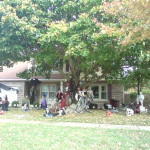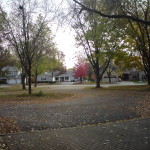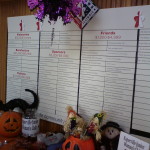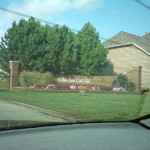Chapter 15: Naperville – Part 1
Beyond Dreams of Aberystwyth | The Book
A few months before I started this trip I was researching my father’s family tree and I read something in a book that when doing this it’s a good idea to make sure no one else in the family has done it first. Good point – and in doing so I did discover some family on my grandmother’s side – the Feldman side – who told me a lot about my family history in Romania.
On my grandfather’s side – Lew Decent – less is known. But with a small amount of knowledge of the names of some of the Decents in our clan, having an unusual name – and the help of certain social networking sites – I cast a net towards various Decents – and my net ‘caught’ Hilary and Ross Decent. Well I caught Hilary really, a Decent by marriage, but anyone who takes this name on willingly deserves recognition. She sent me an email and told me her husband Ross (my cousin) didn’t know anything about his grandfather’s name ‘Decent’ or where they came from in Eastern Europe (my initial question) – only what we all know – that the name wasn’t ‘Decent’ originally.
Hilary is very much ‘out there’ in the social networking world (much more than me) and was very happy to make my cyber acquaintance. She also told me she and Ross de-camped to the USA 4 years ago, and that she is a writer, one of her subjects being a couple of Brits living the ‘American Dream’ in the town of Naperville, an hour from Chicago. Uncanny. She also invited me to stay if I was ever over there. On such a trip how could I resist?
You never know what you are going to find when you turn up long lost relatives. Hilary and I, however, had been in correspondence so I knew a bit about her and Ross and Naperville. Her description of Naperville as ‘Stepford wife / Desperate Housewife’ on a journey through America sounded – if not exactly ‘my kind of place’ – certainly interesting.
But first things first. We had a fright night to attend to. Within an hour of meeting them at the station they’d got into their costumes (Mrs Lovett from Sweeney Todd for Hilary, Colonel Mustard from the Cluedo game for Ross) and whisked me off. I soon found myself in a community hall filled with about 100 other good Naperville citizens dressed as witches, the Addams Family, the 7 Deadly Sins, a headless horseman (with real horse), werewolves, zombies, vampires, Lizzie Borden plus tormenting children, ‘Death’, various other murderers, ghouls and the rest of the characters of the Cluedo game. As darkness fell Hilary and Ross went off with the other volunteers to play their part in Naperville’s annual All Hallow’s Eve event at the Naper Settlement, a reconstructed historical village, while I wandered, gawped, and try not to get too freaked out. (I’m not too keen on that sort of thing actually!)
Only in America. Only in America could you persuade that many people to go to that much trouble and expense – fantastic costumes! – to go out on 2 consecutive wet October evenings to entertain everyone else in town. Teenage girls shrieked at them, boys tormented them and young children (who in my opinion shouldn’t have been there at all) freaked out. America is so into Halloween, the event was a real hit. They did a fantastic job and everyone staggered into the volunteer hall 3 hours later, removing wigs, false limbs, wiping fading fake blood from faces and necks.
What a way to meet Hilary and Ross. Despite the madness of the introduction they seemed very down to earth people, simply throwing themselves full steam into the whole participating-in-community-life thing which this type and class of America does. When we got home we had a good chat and they told me how coming to America (when their 2 children were in their 20’s) had been a fantastic opportunity to discover and be themselves more fully, away from the restrictions and expectations of old family and friends, and the spirit of negativity that I can see can from this distance as being a British thing. Americans – for all the cheesiness we knock them for – are very positive people, sometimes relentlessly and annoyingly so, but also, I am learning, genuinely so, genuinely trying to do good, have fun, make things happen instead of moaning about them not happening, as can be the pervasive British style (including my own at times).
Ross and I are connected through having a set of great-grandparents in common and I immediately saw a family resemblance, the dark eyes and hair of my father and his family. My grandfather Lew was brothers with Ross’s grandfather Manny – or Bob as he was known. (When I was un-earthing family records in the UK some months earlier on Ancestry.co.uk I found shipping records of both brothers making a trip to America! Neither made their fortune, both returned and lived the rest of their lives in the UK.)
So my Dad Ronald was 1st cousins with Ross’s father Bernard, and they did hang out together as boys, 2 of a group of 7 boys – brothers and cousins of the same generation who formed a little family pack. Ross had never heard of me, which seemed to confirm that my father’s name was barely mentioned by the family after he left London in 1953, perhaps the shame of his actions regarding Margie and Jackie – Ross knew nothing of that – being the initial incentive – his subsequent absence from the UK for 20 years in the long-term making him easy to forget. Ross knew my father’s 2 brothers but my Dad was simply ‘the other one’ no one knew much about – the black sheep he always was.
What was interesting to both of us was the family tree stuff. Our shared great-grandparents were Nathan and Leah Decent. Ross was overjoyed to hear that I had discovered a bit more about our silly family name. I’d discovered that both our grandfathers, born in Britain – were not named ‘Decent’ on their birth certificates, but ‘Dizand’. The third of the siblings born a couple of years later was ‘Dicent’. The fourth was ‘Decent’, by which time everyone in the family had adopted the name. So there was the evolution of the name – changing from ‘Dizand’ to ‘Dicent’ to ‘Decent’ over about 5 years.
My grandmother’s side (Feldman before she married) came from Romania (see Chapter 2, Chapter 3 & Chapter 4) but still no one knows for sure where Nathan and Leah ‘Dizand’ originally came from, probably Russia or Lithuania – one of many Jewish families whose origins were lost in the great collective forgetting that went with surviving emigration and fleeing pogroms at that time. It is a mystery both Ross and I would very much like to solve. So we had a lot to talk about, that and the family gossip of course.
The next day we ‘did’ Naperville. Hilary had described it as Stepford wives / Desperate Housewives territory, so did this mean I could have superior little chortle about it and head off to the place really worth seeing, nearby Chicago? No. Hilary is a writer and blogger like me, but unlike me far more dedicated about the whole thing, and Naperville is her main subject. She wanted to show me around so that day Ross and I braced ourselves for a whirlwind of social activities.
Naperville is quintessential American suburbia, there’s no getting away from it. Large, beautiful homes, occupied by people who have the time and money to do things like:
- lobby for and get the best for their children (obsession with family activities and excellent local schools – aren’t they always when middle class parents are in abundance?)
- create nice homes, have nice clothes and things (nice houses, lovely shops)
- put time and resources into their locality, making it safe, interesting, cultural and pleasant
- having fun, in their own way.
Is all this necessarily a bad thing? Clearly not. Isn’t this in fact what most people want? So why is my first instinct to knock it? I was determined to have an open mind as I looked around.
The first place Hilary and Ross took me was Loaves and Fishes, a major charitable project which distributes food (groceries) to people in the community who are struggling financially – single parents, the unemployed, the elderly, homeless, anyone at risk through poverty – of which there are a growing number. As if often the case in ‘posh’ places the poor are there but invisible. At the time (2010) 5000 of its 145,000 citizens (about 1 in 30) were being supported by Loaves and Fishes, with 100-150 new families registering each week. The project does a lot of good and is aimed at empowering people, providing advice on education, health, other assistance they may be entitled too, counselling, transport, as well as food.
A lot of the more affluent people of the town give their money or time volunteering to Loaves and Fishes. Hang on a minute, isn’t all this the job of government? In Britain we collect money from taxes to do all this, not expect private giving to do it. And faulted though that system may be I don’t think that’s a bad idea.
But it seemed to me here that America is very different in its expectation of government provided safety net. Maybe America’s history of people making lives for themselves out of what they found is at the root of this, and self-sufficiency is a strong value. Many of the people receiving support from Loaves and Fishes do not want to be, and were desperate to get off it as soon as possible. ‘There but for the grace for God go I’ seemed to be the attitude of the volunteers too – anyone could fall on hard times, they deeply respected the people they were helping, an attitude based on an understanding that we help each other when in trouble.
So there is strong culture of personal giving and volunteering. A Brit I met in San Francisco commented on the ‘can do’ attitude of Americans – if they see something that needs doing the instinct is not to (1) moan about it, or (2) complain to the relevant body about it, but to do something about it themselves. This could be clearing a blocked street drain, saving an historical building – or feeding the poor. I’m not saying it’s perfect but I did like the way Americans had a sense of personal responsibility for their world, not expecting others – someone else – to sort it all out. It made me wonder if in the UK with our long history of hard won rights to government provided services – we have lost something – a sense of personal responsibility for our world.
Everywhere you go in America there is a building, art gallery, even a highway named after the person or business who funded it. There is a spirit that those who have (wealth) have a responsibility – a duty – to share it in this kind of way. I was reminded of the woman I met at Denver station who believed if you have, you give – ‘Give till it hurts.’ Really? I rarely give anything – ‘can’t afford to’ – it’s ‘not my job.’
From one extreme to another – Hilary had planned our day well – after Loaves and Fishes our next port of call was Naperville Women’s Club Annual Fashion Show and Luncheon at the White Eagle Gold Club. Yikes. Hilary had given me a re-assuring once-over that morning as I pulled on the smartest rags I could muster from my rucksack – I hadn’t packed for this type of ‘do’. I passed.
Enter Desperate Housewives territory.
Back to Chapter 14
Forward to Chapter 16
Full Table of Contents
If you have enjoyed this and would like to see ‘Beyond Dreams of Aberystwyth’ go further please click on this link to see what you can do to help make that happen! You can also submit comments below. Thanks for reading.











Leave a Reply